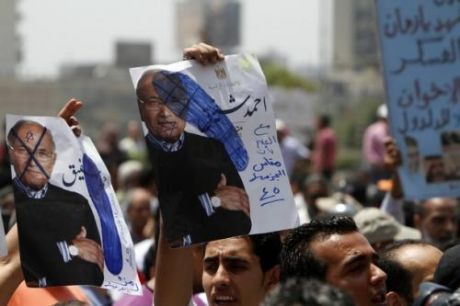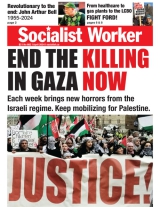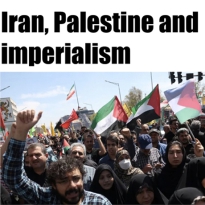Features
You are here
Egypt: elections and the ongoing struggle

June 13, 2012
Egypt’s presidential election has produced a runoff that will be decided on June 16-17 when Egyptians return to the polls.
The contest will come down to a choice between Mohamed Mursi, the candidate of the Muslim Brotherhood, and Ahmed Shafiq, the last prime minister under Hosni Mubarak. These two candidates emerged at the head of the pack following the first round of voting in the presidential elections held May 23-24, edging out the next leading candidate, Hamdeen Sabahi of the Nasserite Dignity Party, who received 20 per cent of the vote.
Shafiq or Mursi?
The powerful Salafist Nour Party announced support for Mursi in the runoff vote, anti-Islamist parties such as Tagammu and Wafd called on both candidates to respect a civil state system of government, while some prominent liberal figures—such as the former head of the Democratic Front Party Osama El-Ghazali Harb—decided to unconditionally support Shafiq due to fear of an Islamic party coming to power.
Surprisingly, Al-Jihad, which is another Islamist movement, declared support for Shafiq and announced plans to launch a political arm, the Democratic Jihad Party, against the Muslim Brotherhood’s candidate Mursi.
Many of the revolutionaries and supporters of Sabahi are disgusted by the thought of a leading member of the Mubarak regime returning to power, but also concerned about the prospects for the revolution with an Islamist-led parliament. This difficult choice has meant that pro-revolution forces are disunited over whether to hold their noses and vote for Mursi to stop Shafiq or whether to vote at all.
But there is unity in support of the revolution and against the regime. On June 2, the ousted president and his interior minister Habib El-Adly were given life sentences for their role in the killing of protestors, but six top police chiefs were acquitted and Mubarak and his sons were cleared of all charges in financial corruption cases. These disappointing verdicts brought the pro-revolution public back to Tahrir square and other Egyptian cities in their millions. These were demonstrations, not only in anger at the verdicts, but also impassioned calls to resist the rise of Ahmed Shafiq. Even provincial cities such as Damietta had huge turnouts and others, such as Qena in Upper Egypt saw large numbers protesting for the very first time.
Conflicts between different movements and the state
As the conflicts intensify and the situation becomes more complicated, several fault lines have emerged in the political landscape of Egypt. Mostafa Ali, a member of the Revolutionary Socialists in Egypt, reported on the major conflicts in Ahram Online: “These major conflicts are the battle between the ruling military council and the Muslim Brotherhood over who will author the constitution; the conflict between liberal forces and Islamists over the civil-religious balance in the state; and finally, the struggle between non-religious pro-revolution forces and the Supreme Council of the Armed Forces (SCAF) over the duration of the generals’ tenure on top of the political scene.
“Moreover, three new developments on the scene have complicated the picture and accentuated the velocity of the head-on confrontations now taking place: the recent decline in the popularity of the Muslim Brotherhood since January, which makes it more vulnerable to pressures from both friends and foes; the apparent return of the National Democratic Party (NDP) apparatus as a player on the scene via the candidacy of Shafiq; and the coalescence of sizeable revolutionary forces around Hamdeen Sabahi’s candidacy as an alternative to both the Brotherhood and the old order.”
These conflicts are playing out in the attack and isolation of a weakened Muslim Brotherhood by SCAF forces, while many liberal sections of Egyptian society are lining up with SCAF against the Muslim Brotherhood.
The revolution continues
In the midst of this turmoil, there are hopeful signs. The majority of Egyptian voters chose in favour of the revolution. The combined total of the three main opposition candidates is more than 65 per cent of the vote, while the leftovers of the Mubarak-regime, Shafiq received a mere 25 per cent.
In this context, many revolutionary activists are calling for a vote for Mursi in the runoff against Shafiq, who has threatened that he will use full force against the revolutionary movements. The left, including Sabahi who has enthusiastically taken up the call, are proposing a presidential council in which Mursi would work together with Sabahi and the liberal Islamist Abdel-Moneim Abul-Fotouh who came fourth. They have also called for a retrial of the Mubarak family and the six acquitted police officers.
This call was met with criticism from many, but as the Revolutionary Socialists have put it, “the questions is which of the two would we rather fight? A general who will call in the tanks or an opportunist Muslim Brother who is vacillating under the pressure from below and who can be exposed before his own rank-and-file and the masses?”
The Week of Rage declared by activists following the Mubarak verdict show the potential to build on the base of support that opposes both Shafiq and Mursi and reaches out to the wavering electoral base of the Brotherhood. Over 100 leading workers’ movement activists signed a statement organized by the Revolutionary Socialists that places the demands of the street protests and ongoing strike wave on the potential presidential council of Mursi, Sabahi and Abul-Fotouh.
This kind of action—that can unite those who want to see the revolution continue, those disillusioned in the election results and the weakened Brotherhood’s capitulation to SCAF, with the demands of the workers and poor of Egypt—has the power to sweep away the old regime and deepen the revolution.
Section:
Topics:
- Log in to post comments










